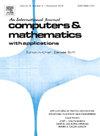在同质和异质介质中使用全离散能量保存部分隐式方案进行声传播和孤子传播
IF 2.9
2区 数学
Q1 MATHEMATICS, APPLIED
引用次数: 0
摘要
本研究提出了一种用于模拟同质和异质介质中波传播的能量保存部分隐式方案。尽管具有隐式性质,但所开发的方案不需要对系数矩阵进行任何显式的数值或分析反演。理论分析和数值实验验证了完全离散方案的能量保存特性。同时还进行了收敛分析,以评估所开发方案的收敛速度。通过对层状异质介质中波传播的数值求解,验证了所开发方案的效率和准确性。此外,还讨论了非线性正弦-戈登方程和克莱因-戈登方程在均质和异质介质中的孤子传播模拟。数值解法还与文献中的结果进行了比较。本方法准确地解决了所选问题的物理特性,与现有的多级时间积分方法相比具有很强的竞争力。此外,它的计算复杂度明显低于四阶 Runge-Kutta-Nyström 方法。本文章由计算机程序翻译,如有差异,请以英文原文为准。
Acoustic and soliton propagation using fully-discrete energy preserving partially implicit scheme in homogeneous and heterogeneous mediums
This study presents an energy preserving partially implicit scheme for the simulation of wave propagation in homogeneous and heterogeneous mediums. Despite its implicit nature, the developed scheme does not require any explicit numerical or analytical inversion of the coefficient matrix. Theoretical analysis and numerical experiments are performed to validate the energy preserving properties of the fully-discrete scheme. Convergence analysis is also performed to assess the rate of convergence of the developed scheme. The efficiency and accuracy of the developed scheme are validated by numerical solutions of wave propagation in layered heterogeneous mediums. Furthermore, simulations of soliton propagation following nonlinear sine-Gordon and Klein-Gordon equations in homogeneous and heterogeneous mediums are discussed. Numerical solutions are also compared with the results available in the literature. The present method accurately resolves the physical characteristics of the chosen problems, competing well with existing multi-stage time-integration methods. Moreover, it has significantly lower computational complexity than the four-stage, fourth-order Runge-Kutta-Nyström method.
求助全文
通过发布文献求助,成功后即可免费获取论文全文。
去求助
来源期刊

Computers & Mathematics with Applications
工程技术-计算机:跨学科应用
CiteScore
5.10
自引率
10.30%
发文量
396
审稿时长
9.9 weeks
期刊介绍:
Computers & Mathematics with Applications provides a medium of exchange for those engaged in fields contributing to building successful simulations for science and engineering using Partial Differential Equations (PDEs).
 求助内容:
求助内容: 应助结果提醒方式:
应助结果提醒方式:


